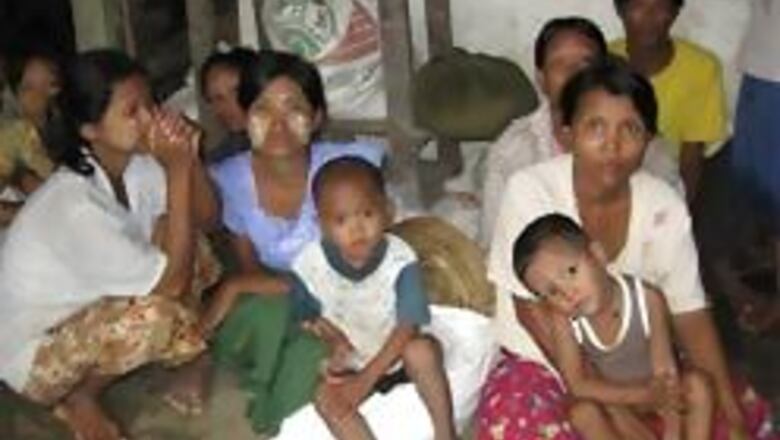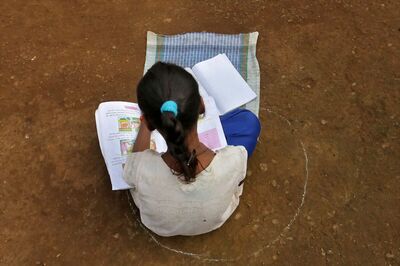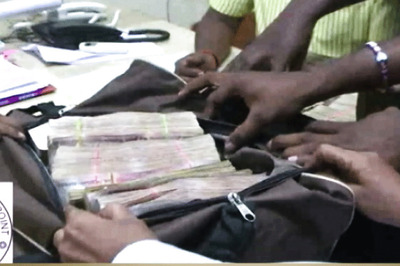
views
Yangon: Myanmar's military government is forcing cyclone victims out of shelters and refugee camps and sending some back to their devastated villages with virtually no aid supplies, United Nations and church officials said on Friday.
Eight camps set up by the government for homeless victims in the Irrawaddy delta town of Bogalay are "totally empty," UNICEF official Teh Tai Ring told a meeting of aid groups.
"The government is moving people unannounced," he said, adding that authorities were "dumping people in the approximate location of the villages, basically with nothing".
UNICEF said after his statements were reported that was reported to UNICEF by they were based on "unconfirmed reports by relief workers."
In his remarks at the meeting, which brought together UN and private aid agency workers to discuss water and sanitation issues, Teh Tai Ring said the information was reported to UNICEF by a relief worker who had just returned from the affected area.
More than 400 cyclone victims from the delta town of Labutta were evicted from a church in Yangon following orders from authorities on Thursday, a church official said.
"It was a scene of sadness, despair and pain," said the official at the Yangon Karen Baptist Home Missions, speaking on condition of anonymity for fear of official reprisal.
"Those villagers lost their homes, their family members and the whole village was washed away. They have no home to go back to."
All left the church in 11 trucks on Friday morning except for some pregnant women, two young children and those with severe illnesses, the official said.
The authorities told church workers that the victims would first be taken to a government camp in Myaung Mya - a mostly undamaged town in the delta - but it was not immediately clear when they would be resettled in their villages.
"The uncertainty of where they will be sent to made them very fearful, sad and helpless," the church official said, adding that many of the victims, parishioners, doctors and nurses were crying.
The government's reasons for moving people out of camps and shelters has not been made publicly clear, but it earlier declared that the relief phase of the rescue effort had been concluded and it was now time for reconstruction.
Foreign aid experts disagree, arguing that many people are still in need of emergency assistance for food and shelter, as well as medical care.
Centralising stricken people in the camps had made it easier for aid agencies to deliver emergency relief since many villages in the delta can only be reached by boat or over very rough roads.
PAGE_BREAK
Aid workers who have reached some of the remote villages say little remains that could sustain the former residents.
Houses are destroyed, livestock have perished and food stocks have virtually run out. Medicines are nonexistent.
Teh Tai Ring said some of the refugees were "being given rations and then they are forced to move." But others were being denied such aid because they had lost their government identity cards, he said.
Terje Skavdal, a senior UN official in Bangkok, Thailand, said he could not confirm the camp closures but that any such forced movement was "completely unacceptable."
"People need to be assisted in the settlements and satisfactory conditions need to created before they can return to their place of origins," Skavdal, head of the UN Office for the Coordination of Humanitarian Affairs, said.
"Any forced or coerced movement of people is completely unacceptable."
Aid groups say Myanmar's military government is still hindering foreign assistance for victims of the cyclone, despite a promise to UN Secretary Ban Ki-moon to ease travel restrictions.
Singapore's Prime Minister said on Friday Myanmar's military rulers are afraid to let in international aid workers to help cyclone victims because it might expose their own powerlessness.
"The military leaders surely know that foreign aid will save lives and help to rebuild the devastated areas," Lee said in a speech opening a three-day Asia-Pacific security conference.
"But they also fear the political consequences of opening up the disaster zone to international aid teams. This might show up their own incapability, and undermine their credibility and legitimacy."
Foreign aid workers are still awaiting visas, and the government is taking 48 hours to process requests to enter the Irrawaddy delta, the groups said.
They said the International Red Cross was waiting for permission to send 30 foreign staffers into the delta.
"We urge speedy implementation of all agreements, on access, visas and use of logistical assets," Skavdal said. "We need to see more relief experts, including (those) from the (International Red Cross), getting into the delta as soon as possible without bureaucratic hindrance."
While saying there have been "promising indications that the government is moving in an overall right direction," the real test remains implementation on the ground, he said.
An estimated 2.4 million people remain homeless and hungry after the May 2-3 cyclone hit Myanmar, also known as Burma. Myanmar's government says the cyclone killed 78,000 people and left another 56,000 missing.




















Comments
0 comment